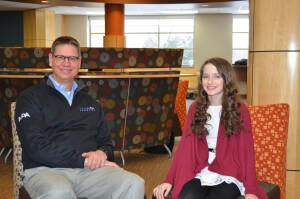January 28, 2016
 There are few opportunities to step away from my duties as Head of School. Last Friday was an exception, however. I had the pleasure of sitting back while sixth grader Ella Fruchterman took the reins as Head of School for the day. Won in the Best of MPA live auction, ‘Head for the Day’ is an opportunity for a student to experience what it is like to lead the MPA community.
There are few opportunities to step away from my duties as Head of School. Last Friday was an exception, however. I had the pleasure of sitting back while sixth grader Ella Fruchterman took the reins as Head of School for the day. Won in the Best of MPA live auction, ‘Head for the Day’ is an opportunity for a student to experience what it is like to lead the MPA community.
It was a great day for me and I hope it was for Ella, too. I learned a great deal about Ella and what it is like to be a middle school student at MPA. Ella is a bright, cheerful student who enjoys her classes and loves her teachers. She is also an accomplished equestrian, placing nationally here in the United States and in Canada in a number of competitions. Ella is successfully able to balance the many hours necessary to train with her horse with her academic responsibilities. I think she is a good example of how MPA students are able to pursue their passions while challenging themselves intellectually.
A recent measure of the MPA Middle School academic program, the ACT Aspire test, recently indicated the success of our students. The ACT Aspire measures both subject area proficiency and college and career readiness. The Middle School achieved “Ready” status, the highest level, in all five subject areas in all four grades.
While I am very proud of our Middle School students and the academic program, I also realize that standardized testing is just one indication or measure of overall student growth and development. MPA’s overall philosophy of student learning is based on research from pioneering education experts including Howard Gardner and Benjamin Bloom, as well as acclaimed modern researchers, such as Carol Dweck. Our curriculum, pedagogy, and assessments are tied to best practices, representing a wide range of experiential learning that involves and reaches students of various learning styles and skills. We know that knowledge and comprehension are necessary for learning, and that it is also essential that students expand their higher-level thinking through application, analysis, evaluation, and synthesis. These 21st-century, higher-level thinking skills are built into our curriculum, with students consistently assessed in both formal and informal ways.
MPA’s small class sizes and individual attention make it possible for teachers to know each student well and provide individual attention. We understand that every learner possesses gifts and strengths, as well as areas ripe for development. We recognize the student who can verbally express complex thoughts, yet has trouble getting them on paper; the student who can memorize math facts quickly and needs applied challenges; the student who can absorb information, but needs extra processing time; and the student who loves to spend the entire day immersed in a book and needs encouragement to play a team game. Projects, writing, discussion, solving complex equations, and drawing are only a few of the many types of assessments that happen year round, enabling teachers to closely monitor each child’s strengths and challenges. Standardized testing, which happens annually in Grades 3–8 and Grades 10 and 11, provides additional information.
While research shows that standardized test results are not fully indicative of any individual student’s learning, such data still can be valuable. MPA administers the ACT Aspire—a vertically articulated, benchmarked, standards-based test—to students in Grades 3–8 and Grade 10, and the PSAT in Grades 10 and 11. We use the results in three ways:
- To better inform curriculum design. We look for trends and patterns in responses to build curriculum and to fill or understand any gaps. In other words, using outside data helps ensure the curriculum delivers the education we intend.
- To identify discrepancies. With each student who doesn’t perform as expected, we consider whether the scoring discrepancy is due to weakness in test taking, just a bad day, or some other concern that needs to be addressed.
- To better prepare students for the testing component that the college process inevitably entails. Testing, like many things, is a skill, and students who have had experience with standardized testing are better prepared for college entrance exams. Curriculum and assessment that is designed to teach for understanding and critical thinking, coupled with experience with standardized testing, provides our students with a solid foundation for their college-bound path.
We recognize that standardized testing alone does not truly identify a child. Our students come to life as individuals in their daily interactions with their classmates, teachers, and curriculum. Because of that, we don’t teach to any test and we keep standardized testing time to a minimum. Every time I interact with one of our students, like Ella, I am reminded of how unique and multifaceted our students are and there is no standardized test that can accurately capture that.